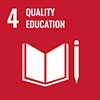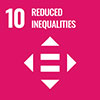Inequality and education system. Proposals to compensate inequality in the Spanish case
TIn the Spanish education system, as in those of many other countries, students are divided into two types: those who attend a state school and those who attend a private one (whether state-funded or not). Private schools are mainly attended by the children of the better-off. This article explains how this system generates and preserves inequality. We will study the possibility of substituting this model with a completely public one and will discuss other alternatives: tax modifications, school vouchers and the introduction of positive discrimination policies to compensate for the disadvantaged position of those who attended state schools and universities, namely the provision of a number of employment positions both in the private and the public sectors.
SDG




 Laura López Domínguez
Laura López Domínguez– John Hopkins University and a Master in Science in Sociology and Demographics from Pompeu Fabra University. She is currently a doctorand in the PhD in Education Program of the University of Girona and collaborates with the Universitat Oberta de Catalunya in the subject of Economics and Well-being of the Master in Economic Analysis degree. She has worked in various public administrations and has collaborated with the Universitat de Girona and the Universitat Pompeu Fabra.



